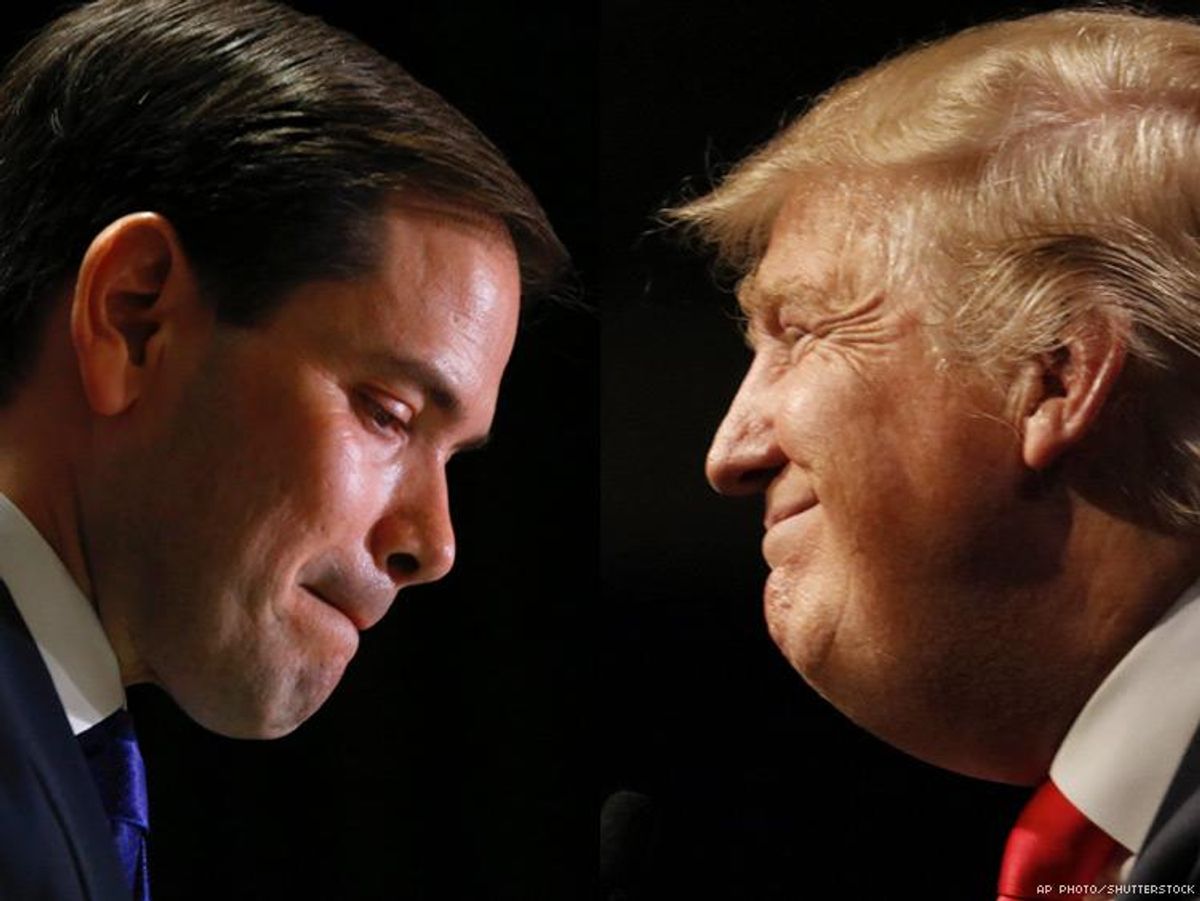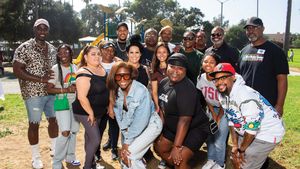Donald Trump has won the Republican presidential primary in the important winner-take-all state of Florida, getting the state's 99 delegates to the national convention.
Trump is also the winner in Illinois and North Carolina, the Associated Press reports. In Missouri, after midnight Eastern time, NBC News declared him the apparent winner with a small enough lead to trigger a recount.
Meanwhile, Ohio Gov. John Kasich scored his first victory of the primary season, in his home state. Ohio, with 66 delegates, is also winner-take-all.
With 99 percent of Florida precincts reporting at midnight Eastern, Trump had 46 percent of the vote, Florida Sen. Marco Rubio 27 percent, Texas Sen. Ted Cruz 17 percent, and Kasich 7 percent, according to the Associated Press. As expected, Rubio's failure to win his home state meant the end of his campaign.
In Illinois at that hour, with 99 percent reporting, Trump had been declared the winner with 39 percent of the vote. Cruz had 30 percent, Kasich 20 percent, and Rubio 9 percent. Trump had been awarded 24 delegates, with the rest to be distributed. In Illinois has 69 delegates, of which 15 are awarded on a statewide winner-take-all basis, with 54 determined by congressional district.
In North Carolina, with 100 percent reporting, Trump had 40 percent of the vote, Cruz 37 percent, Kasich 13 percent, and Rubio 8 percent. The state has 72 delegates, awarded proportionally; so far Trump had 29, Cruz 26, Kasich nine, and Rubio five. Early in the day, Trump also claimed the nine winner-take-all delegates from the Northern Marianas Islands. And in Missouri, with 99 percent reporting, he was leading Cruz 40.8 percent to 40.6 percent. The 52 delegates are winner-take-all, but AP has not included them is his count yet, given the likelihood of a recount.
In Ohio, with 99 percent of precincts reporting, Kasich had 49 percent of the vote, Trump 36 percent, Cruz 13 percent, and Rubio 3 percent.
Trump, in his victory speech from Palm Beach, Fla., about 10 p.m. Eastern, made his usual promises that America will start winning again, in trade and in wars, and that he'll bring jobs back to the nation. He praised politicians who have endorsed him, including former Republican presidential candidates Chris Christie and Ben Carson, and Florida Attorney General Pam Bondi, well known to LGBT Floridians for her attempts to keep marriage equality from coming to the state. "The job she's done in Florida is incredible," Trump said, without getting into specifics.
And just days after disparaging Rubio as "little Marco" during a debate, Trump praised his former rival. "He's tough, he's smart, and he's got a great future," Trump said. The businessman also claimed that he's been the target of more negative advertising and media reports than any other candidate. He's faced "lies, deceit, viciousness, horrible reporters," he said. Watch below.
As Cruz addressed supporters, though, he claimed Trump had promoted by the media, as the businessman is likely to lose to Democratic front-runner Hillary Clinton. "The network suits ... are partisan Democrats ready for Hillary," he said. Cruz, a favorite of the religious right, touted his support for conservative values, while saying Trump has spent a lifetime opposing those values.
Cruz also made typical promises to "repeal every word of Obamacare," abolish the Internal Revenue Service, and reduce regulations on business, as he contends these are destroying jobs. He said he is the only candidate besides Trump with a mathematical possibility of accumulating enough delegates to win the nomination on the first ballot at the convention, and said he'd had "a good night to continue our march to 1,237," the number of delegates needed for the nomination. He congratulated Rubio on his campaign and made a pitch for his supporters, saying, "To those who supported Marco, who worked so hard, we welcome you with open arms." Watch below.
Rubio, addressing his supporters earlier in the evening, said that while he had tried to offer a "hopeful and optimistic" message, it didn't resonate with voters in a year when many are angry. "After tonight it is clear that while we are on the right side, this year we won't be on the winning side," he said.
He urged voters not to give in to "fear and frustration," and he said the very fact of his candidacy indicated that the U.S. is still an exceptional nation. Watch a clip below.
Rubio, one of the last hopes of establishment Republicans, had won only the caucuses in Minnesota and Washington, D.C., and the Puerto Rico primary.
Kasich is another establishment hope, but it will be difficult for him to catch up to Trump in the delegate count. The overall count so far, according to AP, is 621 for Trump, 396 for Cruz, 168 for Rubio (these can now go to other candidates), and 138 for Kasich.
Visibly moved, Kasich addressed supporters in his home state shortly after he was determined the winner. The governor, who has made civility a hallmark of his campaign, promised he won't "take the low road to the highest office in the land."
He expressed optimism about the remainder of the campaign, saying, "We are going to go all the way to Cleveland [where the party will hold its convention] and secure the Republican nomination." Watch below.
Kasich has been more moderate in his rhetoric on LGBT issues, but his record is far from positive, notes the Human Rights Campaign.
"While Rubio, Cruz and Trump have made anti-LGBT rhetoric a common feature of their campaign events, Governor Kasich, the winner in Ohio tonight, has become more vocal recently about his opposition to LGBT equality," reads an HRC press release. "In a debate ... after previously implying that businesses should not be allowed to deny service to a same-sex couple, Kasich backtracked and suggested it was 'common sense' for a business to be able to deny services to a same-sex couple for religious reasons. During his career Kasich has also broken a promise to protect transgender state workers from discrimination and broke a promise to support a statewide LGBT nondiscrimination law as governor."






















































































